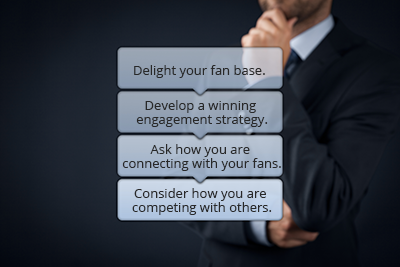Four Engagement Lessons B2B Companies Can Learn From Sports
- B2B marketing and sports marketing have more in common than you may initially suspect
- Both need to engage fans, deal with a fast-paced environment and meet the demands of customers and client partners alike
- Developing a winning engagement strategy and connecting with fan bases can ensure retention for even vastly different companies
Rising expenses. Prima donna athletes. Poor on-field product. Off-field scandals. These are some of the common challenges we hear about professional athletic organizations facing. Any one of these can appear daunting, but imagine dealing with many (or all) of them at the same time, while trying to keep your fans engaged and happy.
 At a recent speaking event hosted by the Business Marketing Association (BMA) of Chicago, the theme was “Customer Engagement from an All-Star Panel of Chicago’s Sports Business Leaders.” The panel featured several great marketing leaders from the Chicago sports scene, including professional baseball, auto racing and college football leaders. To be honest, I wasn’t exactly sure at first how my presentation on the importance of customer engagement in B2B would fit in to this agenda, but I took a leap of faith.
At a recent speaking event hosted by the Business Marketing Association (BMA) of Chicago, the theme was “Customer Engagement from an All-Star Panel of Chicago’s Sports Business Leaders.” The panel featured several great marketing leaders from the Chicago sports scene, including professional baseball, auto racing and college football leaders. To be honest, I wasn’t exactly sure at first how my presentation on the importance of customer engagement in B2B would fit in to this agenda, but I took a leap of faith.
After hearing these marketing leaders talk about their business challenges, however, I clearly saw the connections between sports marketing and B2B marketing. They talked about engaging fans, dealing with a fast-paced environment, and meeting the demands of customers and client partners alike. Four key lessons stood out:
- Delight your fan base. The sports executives each had surprisingly similar views of their fan bases, despite very different audiences and categories. They all noted the intense focus that their respective organizations place on delighting their fan base, with the obvious goal of staying relevant and keeping customers coming back. Think of your customers as fans – are you delighting them? Do they feel like coming back time and time again? What can you do to ensure they want to stay engaged?
- Develop a winning engagement strategy. Do you have a winning record? Every sports franchise (even the Yankees!) goes through ups and downs, but the panelists discussed how driving engagement within their fan bases can carry them through the good times and the bad. Cultivating deeper relationships by understanding customers’ goals and needs is a winning engagement strategy to carry your company through the rough times.
- Ask how you are connecting with your fans. In sports, engagement is often about looking for new ways to connect with fan bases, whether it’s by improving the sound system, expanding the food/beverage offerings, or enhancing the logistics of getting to and from the venue. For B2B marketers, consider how (and how often) you’re helping your organization implement enhancements for your customers. Do you make it easy for customers to connect with you? Are you investing in new and improved touchpoints? Are you asking customers what their preferences are when it comes to engaging with your company?
- Consider how you are competing with others to engage. Unlike the days of old, when many sports franchises were literally the only game in town, most are facing now stiff intra-market competition. And it doesn’t stop there, of course, as fans (and potential fans) are presented with an ever-expanding array of digital alternatives. Similarly, your customers are busy, and you need to be on the top of your game to warrant their precious attention. How are you competing for your customers’ time? Do they prefer to engage with your company versus a competitor?
I enjoy sports of all kinds, so maybe it was an easier bridge for me to make the connection between sports marketing and general B2B marketing. At the end of the day, it’s all about securing and maintaining engagement with your fans (or customers) – creating season ticket holders out of the casual walk-up fan. I’d like to think we could learn something by thinking outside our B2B bubble.
Oh, and I’d guess engagement might be a bit easier when you have a consistently winning record, as I found out when I was trying to leave Chicago the day of the Blackhawks victory parade (three Stanley Cups in six years – can you say dynasty?).
